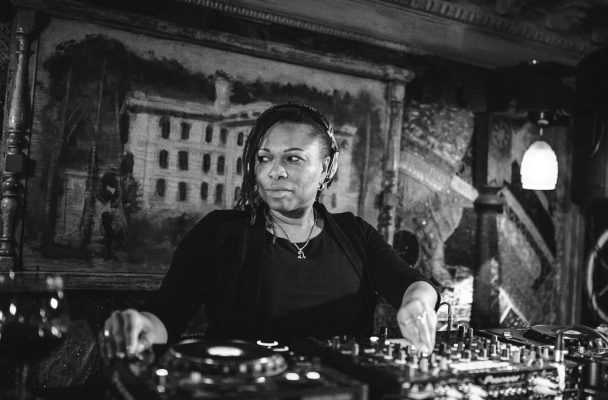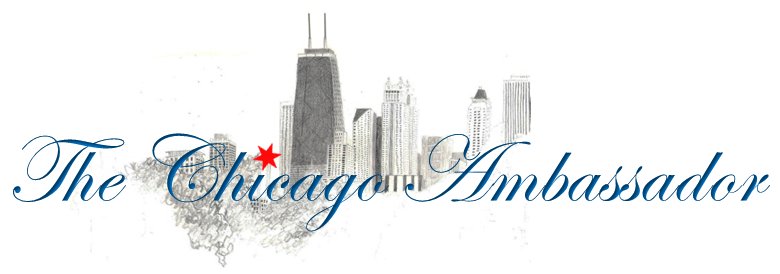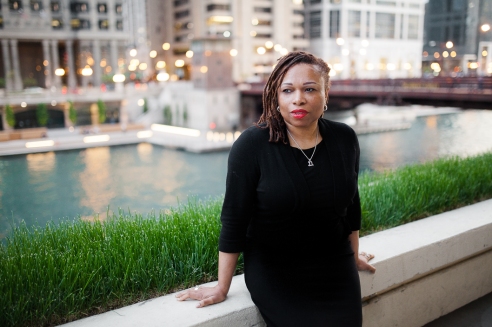Lady D, Chicago’s very own first lady of House music

Lady D doing her thing at a recent gig at the House of Blues. Photo by Holly Donovan.
In the House music world, Darlene Jackson is royalty. Born and raised in the Washington Heights neighborhood on the South Side, Jackson, better known as “Lady D,” has now been a DJ for 20 years. While she is still rocking crowds here in Chicago and all over the world, Lady D has also become an ambassador for House music. Recently she took part in a trade mission at the Pritzker Pavilion, where DJs from the Netherlands who helped fuel the EDM (electronic dance music) craze compared notes with their Chicago inspirations.
In addition, Lady D has just released a new single and is also featured in a documentary called “Girl You Can’t Spin Forever,” which comes out later this summer. i
The Chicago Ambassador caught up with Lady D before a recent gig at the House of Blues where the discussion focused on EDM versus House music, whether DJs who came up after vinyl are any good, why Chicago DJs haven’t made the money of the Europeans they inspired, and how long she plans to stay on the scene.
Interviewed by Bob Chiarito for The Chicago Ambassador.
CA) Your new single “All Night Long” has just been released. How has it been received?
LADY D) It’s been received really well. DJs are playing it, someone just reached out on Twitter and said ‘Oh, I was in a club in St. Louis and heard your song.’ It seems like it’s doing really well.
CA) This wasn’t the first time you did a voice over?
LADY D) No, that’s a lot of my catalog actually – lending my vocals and my spoken word, my poetry.
CA) As for the definition of House music, some say it’s from The Warehouse, others say it came from the music played at house parties. What’s your opinion?
LADY D) My opinion is that it’s a hybrid. I like that people have come to rest on the idea that it’s the House music, the Warehouse music that Frankie Knuckles was playing, and was popularized by the record store imports. People would come in and say ‘I want that stuff that Frankie Knuckles was playing at the Warehouse, at the “house.”‘ So, it was shortened to that, ‘House music.’ I feel like when I was growing up, it was both, but I feel like it’s okay to have one definition that people have settled on. Let’s just say it’s the music from the Warehouse that Frankie Knuckles used to play. I think House is bigger than us, so it’s ok for everybody to come to a consensus. Otherwise you can spend an eternity on the little things.
CA) Do you think House has had a resurgence since Frankie Knuckles passed away?
LADY D) I think it was having a resurgence even prior to that. The explosion of EDM really brought about a resurgence of House. Initially they didn’t call it EDM, they called it House, and people in the House scene were furious.
CA) What would you say are the differences between House and EDM?
LADY D) The soul. The soul of House music, the history of House music. You can’t put that into EDM and say it’s a natural progression from House, because it’s not.
CA) Is it because (EDM) is mostly electronic beats?
LADY D) It’s not just electronic beats.
CA) What I mean is, you’re not going to hear a Gospel track in EDM.
LADY D) Not really, but Gospel House is just a part of House. House is anything. It’s a bunch of different types of music. It’s not just one thing. But when you talk about EDM as it pertains to House, it’s not House. It’s based upon House. Some people may quibble but there’s a fine distinction and I think that’s why people who grew up with House and spent their whole lives with House music weren’t down with that appropriation of House for EDM.
CA) For someone like yourself, it’s really easy to spot the difference.
LADY D) They each have certain markers. You can talk about demographics. The EDM audience is a younger, less diverse audience. And the super-stars and the stars that you associate with the music are demographically different than the superstars of House music, who tend to be people of color and minorities while EDM tends not to be. There are a lot of Europeans.
CA) Is EDM dying down at all?
LADY D) It’s huge. It’s been an amazing commercial success. There’s a lot of commerce behind it. There is a trendiness to it, you kind of wonder if it’s going to last. I don’t know if the kids who are listening to these (EDM) songs today will have the inclination to listen to those songs in 20 years in the same way that House fans do.
CA) When you played at Lollapalooza, that must have been a different crowd being that it was also during the daytime.
LADY D) It was.
CA) More of an EDM crowd?
LADY D) Absolutely. The one thing that I tried to do — I’d say when I play I have different dynamics to my sets. I can go from very soulful to very hard to very techno. I put on a high-tech soul set. I wanted to meet them somewhere closer to where they are. I didn’t want to completely alienate them and tell them ‘you’re going to love this’ and then beat them upside the head with House music that they don’t know or are not familiar with. I play like that when I feel like playing like that and definitely record myself like that, so it wasn’t a departure. But when Greg Kot wrote his review for the Chicago Tribune, he talked about my ‘soulful tech.’ I was playing a cappella, this Jocelyn Brown song on top of some Green Velvet song. I like to mix it up, that’s the type of hybrid approach that I would take when playing for a crowd like that. Give a little bit of house with a little of something that they may be more familiar with, which is the hard driving electronic beats.
CA) You’ve been doing this for 20 years now, correct?
LADY D) Yes, it’s my 20th anniversary of being a DJ, not being in the House music scene.
CA) How did you originally begin to be a DJ?
LADY D) I was just hanging out with DJs. I had a roommate who had equipment and would play around with it. I had some good teachers, some good mentors. I could name people by name but there were quite a few people involved.
CA) You started one of the first all-female DJ collectives, SuperJane. (with DJ Collette, DJ Heather and Dayhota). What was that about?
LADY D) Those are my girls (laughter). Around 1997, we just decided to form a collective where we could talk about women as DJs, not as women DJs but as women who DJ. Even though people think of it how they want to, which is as a group of female DJs, we are women who happen to be DJs.
CA) Has that gotten better over the years?
LADY D) Of course. We’re all successful in our own ways.
CA) They are still involved in the scene?
LADY D) Yes, independently and collectively.
CA) You still work together?
LADY D) Yes, all the time.
CA) When did you form D’Lectable Music and what prompted that?
LADY D) In 2004. I had worked for a record label. I was a label manager and had done A&R (After Hours Music), which was a subsidiary of a big independent label. At the time, they were probably a $5.5 million dollar company. They had a lot of success in the Hard House realm and they had the desire to go into Deep House. I enjoyed working with them. A couple years after they folded, I met a business investor who asked me what I wanted to do. I was DJing quite a bit and said, ‘I think I want to start my own label’ and he believed in me and said, ‘Ok, do it.’ He was able to finance it and I ran it creatively and operationally.
CA) Is it still active?
LADY D) It’s on hiatus right now. I haven’t decided what I want to do with it. We did go from being an all-vinyl label to a digital label. Our vinyl distributor folded when a lot of record houses were folding. From 2004 to 2007 we were extremely prolific, but the distributor just folded. So, I took a year off and decided to regroup. I went to Amsterdam for a dance music conference and a distributor from Germany told me, ‘We want to distribute your music.’ So for two years I worked with them. The digital business is quite different than the vinyl business. So, while we were were self-sustained with vinyl, it’s a losing proposition digitally. You couldn’t make any money.
CA) You’d think it would be easier in some ways because there’s less overhead, right?
LADY D) It is less overhead, but it’s very diluted. There is no real physical product, so you can’t say I’l buy 4,000 copies at $1 each and then distribute those copies at $4 for each copy. With the digital model, you’d have to sell thousands and thousands.
CA) Was piracy a problem?
LADY D) I can’t say that it was but what was really the problem was that you can’t market to enough people to get the type of growth that you want without having a big budget. So that’s why music has moved into a mode where you don’t really sell music, you sell product. Music is used to to sell products in hopes of selling music.
CA) Yes, a lot of new bands are having their songs used in commercials. Years ago, that was really frowned upon. Now it’s like you have to do what you have to do to get more exposure and sell your music.
LADY D) Yes, it’s like movie stars being on TV shows.
CA) I know you’ve talked about lugging records around to your gigs and now a lot of times you bring a computer drive instead. For the DJs who come up now, without turntables and records, is there a big difference? Are they DJs?
LADY D) That’s a hot debate, that’s a hot topic. I personally feel that you don’t have to do things exactly the way we did them to be right. I don’t really feel it’s about the medium or the technology. I can rock a crowd in any medium, with any technology. I don’t care if it’s a Serato (DJ software), I don’t care if it’s my digital thumb drive, I don’t care if it’s vinyl. But, can the new crowd do that? Can they use any setup and rock the crowd? Or do they need the Serato and that’s all they know? While my possibilities are limitless, theirs are very confined. So, are they a DJ? Yes, in certain senses, but not in every sense, so they lack. So, if they put us together, 5 times out of 10 they are going to step up to something that they don’t recognize and they aren’t going to be able to perform. I’m going to be able to perform each and every time.
CA) What do you think of critics who say DJs aren’t musicians?
LADY D) I agree, we’re not always really musicians. Some of us are though. We are really people playing other people’s music. Why are we elevated to the status we are remains to be seen.
CA) But not everyone can do what you do.
LADY D) Right. Not everyone can do what you do and not everyone can do what they do either. I saw Stevie Wonder in concert last year and nobody has come close to that. He’s a virtuoso. Anyone who performs would strive to be that but you can only do what you can do. So, I can’t play 11 musical instruments. I can play one very well; it’s called the turntable (laughter).
CA) Do you want to say your age?
LADY D) I’m a lady and a lady never tells. I would say I’m in my 40s. I don’t dwell on age; these are things that limit you. All that stuff is so passé. It’s about connecting and spirituality. I’m not saying that I’m a young chicken, but I don’t want to let anyone categorize me and say that I’m old.
CA) When I interviewed Joe Shanahan, he told me that when he was going to The Warehouse, one of the things that appealed to him about House music was the do-it-yourself attitude that was similar to punk rock. Do you agree with that, that House music has a kind of outsider vibe?
LADY D) Part of the problem of House is that others have taken our art form and marketed it in a way that has grown successful for certain segments. I think sometimes people (in the House scene) look at it bitterly, because we’ve been striving and struggling for so long while others have made more money from it.
CA) Maybe in some ways that draws more ears to true House music, even if the specific act or song that draws them to the scene as a whole may have been a sellout.
LADY D) Yeah.
CA) Why do the DJs in Europe seem to make a lot more than the DJs here?
LADY D) The music in general in Europe has been more about commerce. They always treated it as such. I have to say, the scene in Chicago always has had a lot of opportunistic people with their hands in the pot, making bad deals and really taking advantage of people. In Europe they want to get everybody paid and they are going to demand it, where in Chicago there was a feeling like ‘I have to keep it all for myself because it’s not really that much to begin with, and I won’t tell them that I’m making this deal because then they’re going to want some of the pie,’ even though they deserved all of the pie because it was their work. It was very treacherous and it really left a bad taste in people’s mouths. The legacy remains, people are still bitter. Like I said before, House is bigger than all of us, but it (the past injustices) perpetuates itself and it’s terrible.
CA) I’ve heard you say before that you don’t eventually want to be the 50-year-old in the club. How long will you keep going?
LADY D) Part of me thinks, ‘Work until they don’t want you.’ I look at people like Diana Ross and Aretha Franklin, and nothing is stopping them. So on the one hand, I don’t want to limit myself, but on the other hand, I don’t know if I’ll want to be in a club with 20-somethings when I’m 50. I think people might admire it, but they also may think, ‘What is she doing?’ Even if I’m on that pedestal in the DJ booth, I think it works for men in a way in doesn’t work for women. There’s also a certain lifestyle that goes with being a DJ. I don’t know if I’ll be in front of those audiences. Maybe I’ll be playing for music connoisseurs who are older. I think the older I see myself, perhaps it’s more dignified to do corporate events or sponsored events. Because being in a sweaty nightclub where people are pushing each other around, I don’t really see that for myself. I’m not putting an expiration date on myself, but when it happens I’ll know. It will be like that line from the movie Lethal Weapon, “I’m too old for this shit.” I think men are a little more robust. I’m soft. I’m a flower and at the end of the day, there’s Lady in my name.
Be sure to “Like” us on Facebook!



2 Responses to “Lady D, Chicago’s very own first lady of House music”
[…] Lady D, Chicago's very own first lady of House music. […]
[…] DJ Lady D Darlene Jackson also mentioned it as […]